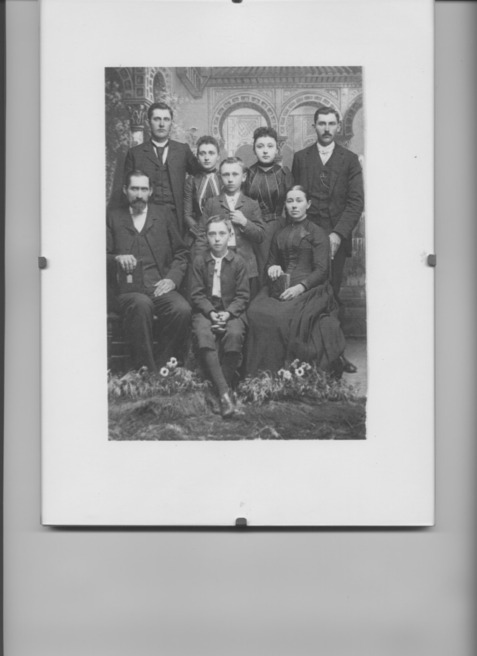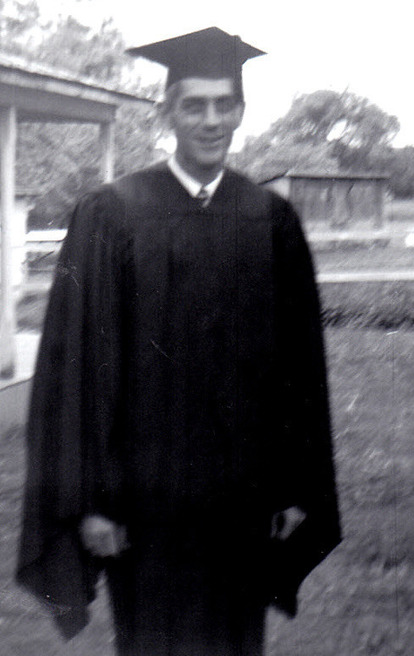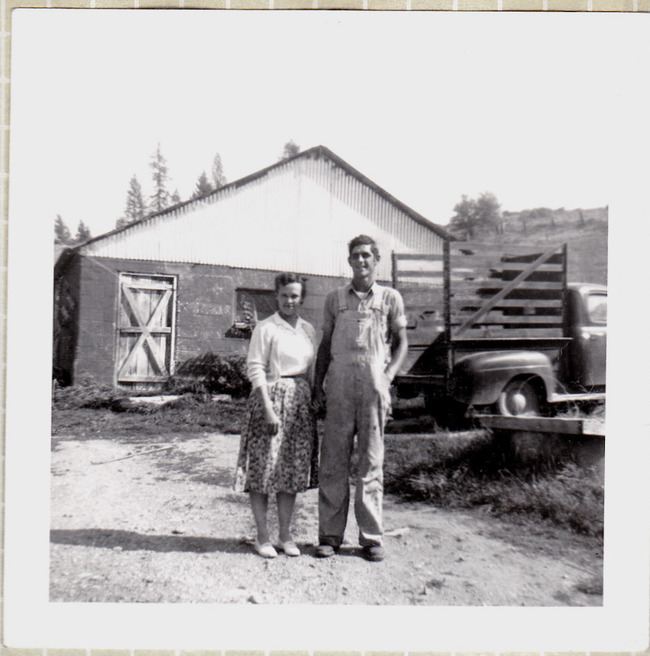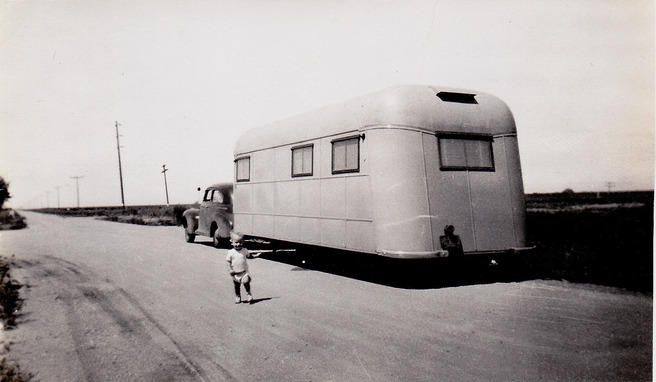Walter's Family History
Transcribed from a barely audible audio tape:
This is Walter Johnson, and I’m sitting with Ruth Westerbeck. We are discussing my family and my father’s family. This is August 2, 1999. Ruth has requested that I tell her what I know about my family and their origins and a little bit about their lives.
My father, Walter Scott Johnson, Sr., was born in 1867 and died in 1947. He was the eldest son (child) of my grandfather, John T. Johnson. He was one of six children and they lived in a farming community inCarroll County,Indiana. My father left school after the third grade – in those days the boys left at that age to help on the farm – and he stayed on the farm with his father and family until, I’m thinking or guessing, he was in his mid-twenties. As a young man, he got into the purebred hog business raising Poland China hogs for show and was quite successful in showing them. But a disease called cholera hit his herd, and he lost the entire herd. After that he was totally disenchanted with farm life and decided to go to town, so-to-speak. He moved toIndianapolisand became a realtor. This occurred, I think, in his mid-twenties.
He [Walter Sr.] married [Fanny Mustard] sometime after that and had two children: a son, Harold, and a daughter, Alma. Harold died in WWI and his daughterAlmalived to be in her mid-seventies. I, of course, never knew my half-brother, Harold; but, I certainly did know my half sister, Alma. We lived close together and were close family. My Dad’s first wife’s, Fanny Mustard, family owned a farm on the outskirts ofIndianapolis, and she died of a heart attack in 1919 or 1920.
My Dad was a very successful realtor, and in what I’ll call the “roaring twenties”, he decided to make an addition toIndianapoliswhat we now call a “subdivision” (they called it an “addition”). He went to the expense of developing a whole subdivision, putting all the utilities and streets in. Then the crash of 1929 just absolutely wiped him out. The subdivision was all ready to go; they had three or four model homes built and they subsequently lost everything. He owned the farm, but he was really extended in the development of the subdivision, and he lost the farm, too. He was at the time on the board of directors of one of the leading banks inIndianapolis, which held all the mortgage paper for the subdivision. About the same time the subdivision failed, the banks also failed. So, what equity he had in the bank, he also lost. This completely wiped him out; and, even though the recession was over by the mid-thirties or late-thirties, he just could not recuperate. In fact, at the time of my birth, February 23, 1923, he had estimated net worth of $250,000, which was big money in 1923. But, as a result of the depression (and recession), he lost everything he had, and he was never able to regain that. He lost the farm and took bankruptcy. At that time, he was married to my mother [Blanch] and I was in the picture. We lived in the city ofIndianapolis, and Dad also lost that home. When he lost that home, we moved out to the country onAlmaand Manual’s farm (Dad had given Alma & Manual this farm as a wedding present, around 1918) to what was called a “tenant house” which had electricity and stove heat, but no running water. So he rode out the depression there where his health deteriorated and he had a series of strokes. I didn’t realize the three years I was in the service how much his health deteriorated because I was rarely around. When I got out of the service, the first time I went home I was really surprised how he had deteriorated. At that time (June of 1946), he was in a wheel chair. I got out of the service in April of 1946, we got home by June, and that’s when we began our move toPullmanand WSU. Then he died just before Thanksgiving of ’47. We were all back [inIndiana], your mother and I and you and Walt. We stayed there from early October through Thanksgiving, so we were there when he died. After he died, Granny [Blanch] moved in withLorraine[my sister] and Charles, and she lived with them for the rest of her life [30 some years].
The stock market crash was in 1929, and that was Day One, so to speak, of the Depression, which really lasted clear through the thirties. When I got out of high school in January of 1941, a graduate was lucky to get a job. I got a job working on a construction crew building an oil refinery on a farm adjacent to where we lived. I felt really lucky to have a job that paid sixty-five cents an hour. After the construction of the refinery was completed, I was given an opportunity to work in the refinery laboratory testing the various oil products. And, I got a ten-cents-an-hour raise, and that was when Martha and I decided we could afford to get married because I was making $30 a week!
Blanche Johnson [Granny] and her first husband separated and divorced sometime in the early twenties, or maybe 1919. She had two children: Herbert, the oldest, andLorraine. At the time she married,Lorrainewas, probably, eight or nine. She was twelve years older than me. Herbert was a little older, I don’t know how much; I’m thinking maybe five or six years. He lived with his father for a short time, and then he migrated west. He wound up inSalt Lake City, and I don’t know what he did, but he was working, and that’s where he met his wife, Nora. They were married and then they migrated toSan Franciscoand lived there for the rest of their lives. I’ve forgotten when they died; she died first, and he died somewhere in the early 1980’s.
Granny’s first husband was a laborer of some kind, I think. He became involved in some kind of church that was more of a cult, and their marriage disintegrated, largely because of that. She divorced him. She got acquainted with my father because they were both members of the same church (PleasantviewLutheranChurch). He was single because his wife had died, and she was single because she had divorced. There was an eighteen-year age difference between them. She was 38 when I was born, and he was 56. But, to my knowledge, they had a good, solid marriage and were very happy together and devoted to each other.
Then Granny lived withLorraineand Charlie for 30 years and died in 1978. There is a picture of Granny and I taken on our birthday in 1975. Incidentally, our birthdays were the same, February 23; and,Lorraine’s birthday was February 24. So, we always had a gala celebration on our birthdays. My father was not far behind either, his was March 9. Martha and I had kind of hoped that Walt would be born on my Dad’s birthday; however, at that point, we didn’t know whether Walt was a boy or a girl. Granny was 90 the day the picture of us was taken in 1975; and, she lived three years after that, so she died in 1978.
After Dad lost everything in the Depression, he stayed in the real estate business and he eked out an existence that was not what they had been used to. But, they had free rent (atAlma’s). It was a common belief among the family that the Depression killed him; however, he was almost eighty when he died. But, the Depression took its toll on him, there’s no question about it. It was a tough time; and it was for millions of people. Suicide was a way out for a lot of people. Dad never lost his drive to try to come back. In fact, he stayed active in the real estate business until he started having strokes, and that confined him very quickly.
(see photo above)
In the picture [of my Dad’s family], my Dad is in the back row on the left. Standing next to him is Laura Johnson (born 1871), who was one of the two girls. And next is Nettie Johnson. I don’t know their ages or when they died. The only thing I know about the kids [Dad’s siblings] is that there was a few-year interval between each one of them. I’m a little unclear about the order. The second oldest was Robert, and he is the third person on that back row. He was born in 1869 and died in 1952. As you look at the picture, first in the second row is John T. Johnson who is the father, my grandfather. He was born in 1839 and died in 1927. I just barely remember him. I was just four years old [when he died], but I do remember him laying on his deathbed. He had been confined to bed for some time and obviously knew that his time was short. He asked my grandmother to hold his hand as he lay in bed. He said when he saw the angels coming, he would squeeze her hand. And, he did, just before he died. It is a touching thing that was told by the family from the time I can remember.
Next to John T. in the picture is Fletcher who was born in 1879. I don’t know the year of his death. He worked with or for my Dad in the real estate business for several years. They had an office in downtownIndianapolis, and my Dad specialized in the sale of farms, and Fletcher specialized in the sale of city property. Fletcher also ran a rental management arm of the company, too, again for city property.
Standing next to Fletcher is Sarah Johnson, that’s my Grandmother. She was born in 1845 and died in 1940. I remember her death and going to her funeral.
And, the last member of the family is Jess, and he was the youngest (born 1880). He’s sitting in the picture in the front between Fletcher and John T. I’ve forgotten when he died…he was the last of the children to die.
About this picture [John T. Johnson family, circa 1890], I guess the photographers in those days wanted people to look stern rather than smile and say, “cheese”. I guess that was just the way it was done.
Both Grandma (Sarah) and Laura were really joyful people and rather boisterous, too. The boys, my Dad and Grandpa were relatively calm and sober. They had an annual birthday party--Grandmother Johnson’s birthday was August the 11th—every year the whole clan assembled at my Uncle Bob’s house on a Sunday nearest August 11th as you could get to celebrate her birthday. Oh, Uncle Bob’s birthday was also on August 11th , so it was a pretty gala celebration and a lot of fun. Grandmother died when I was about 17. I always spent two or three weeks every summer when I was ten to fourteen, in that age span, with my Uncle Bob on the farm. It was an annual thing for me to do; and, of course, I always saw my Grandmother a few times during those stays. I helped Uncle Bob with the farm…his big thing was for he and I to go hoe corn (hoe the weeds out by hand). It was fun…we were good friends. I idolized him, as I did my Dad—they were great guys.





